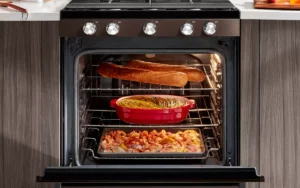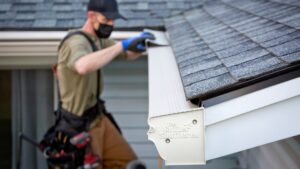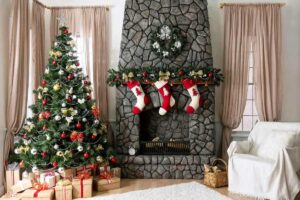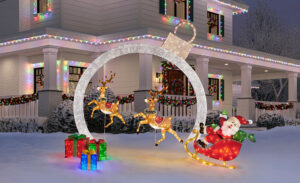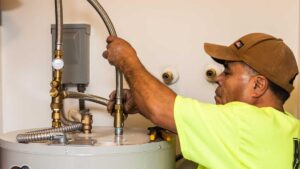Winter brings cozy nights, twinkling lights, and festive charm, but it also introduces unique electrical risks. As heaters, holiday lights, and appliances work overtime, the chances of electrical hazards rise. By taking a few simple precautions, you can keep your family safe, reduce fire risks, and avoid costly damage during the coldest months. Here are essential winter electrical safety tips to help you weather the season hazard-free.
1. Inspect Space Heaters for Safety
Space heaters are a winter essential, but improper use can lead to electrical fires or shocks.
- What to do:
- Use only UL-listed space heaters with automatic shut-off features (in case they tip over or overheat).
- Keep space heaters at least 3 feet away from curtains, furniture, blankets, or other flammable materials.
- Plug space heaters directly into an outlet—not an extension cord or power strip.
- Turn off space heaters when leaving the room or going to bed.
- Why it’s important: Space heaters are one of the leading causes of home fires during winter. Safe usage prevents overheating and reduces fire risks.
2. Be Cautious with Holiday Lights
String lights are festive but can be dangerous if damaged or overloaded.
- What to do:
- Inspect holiday lights for frayed wires, cracked sockets, or broken bulbs before hanging them.
- Use lights labeled for indoor or outdoor use as appropriate.
- Limit connections to no more than three strands of lights per outlet to avoid overloading circuits.
- Turn off holiday lights when you’re away or asleep. Use a timer or smart plug for convenience.
- Pro Tip: Replace incandescent lights with LED lights, which use less energy and generate less heat.
- Why it’s important: Damaged or overloaded holiday lights can cause short circuits or fires, particularly on dry trees or near flammable decor.
3. Avoid Overloading Outlets
During winter, your outlets work overtime with space heaters, lights, and appliances. Overloaded outlets are a recipe for danger.
- What to do:
- Spread devices across multiple circuits to avoid overloading any single outlet.
- Use surge-protected power strips for extra safety with electronics and small appliances.
- Never “daisy chain” power strips (plugging one strip into another).
- If outlets feel warm to the touch, stop using them and contact an electrician.
- Why it’s important: Overloading outlets can overheat wiring, trip breakers, or cause electrical fires.
4. Check Extension Cords
Extension cords are handy in winter but can pose serious hazards if used improperly.
- What to do:
- Use heavy-duty, outdoor-rated extension cords for any outdoor lighting or tools.
- Never run extension cords under rugs, carpets, or furniture, as this can trap heat and cause a fire.
- Inspect cords for damage and replace any with cracks, frays, or exposed wires.
- Do not exceed the cord’s maximum wattage.
- Pro Tip: For long-term needs, have additional outlets installed instead of relying on extension cords.
- Why it’s important: Damaged or overheated cords are a common source of electrical fires during winter.
5. Keep Electrical Devices Dry
Snow, rain, and winter moisture can wreak havoc on electrical systems, especially outdoors.
- What to do:
- Use weatherproof outlet covers for outdoor outlets to protect against moisture.
- Keep electrical devices, lights, and cords away from puddles, wet surfaces, or melting snow.
- Wipe down wet appliances or electronics before plugging them in.
- Pro Tip: If water comes in contact with electrical equipment, have it inspected before using it again.
- Why it’s important: Water and electricity don’t mix—moisture can cause shocks, fires, or short circuits.
6. Test Smoke and Carbon Monoxide Detectors
Winter means increased use of heaters, fireplaces, and appliances that can release carbon monoxide.
- What to do:
- Test smoke and carbon monoxide detectors monthly to ensure they’re working properly.
- Replace batteries at least once a year, or when you hear a low-battery chirp.
- Install detectors near sleeping areas, kitchens, and areas with gas appliances or wood stoves.
- Why it’s important: Faulty detectors can leave you unaware of smoke or carbon monoxide leaks, putting your family at risk.
7. Safeguard Your HVAC System
Your heating system works overtime during winter, so it’s critical to keep it running safely.
- What to do:
- Schedule an annual HVAC inspection to ensure wiring, controls, and connections are in good shape.
- Replace HVAC filters monthly to improve efficiency and prevent overheating.
- Keep the area around heating equipment clear of flammable materials like furniture or boxes.
- Pro Tip: A clean and inspected HVAC system reduces electrical hazards and ensures energy efficiency.
- Why it’s important: Faulty heating systems are a common cause of electrical fires in winter.
8. Be Mindful of Generators
If you use a generator during winter power outages, safety is key to preventing electrical accidents.
- What to do:
- Operate generators outdoors, away from doors and windows, to avoid carbon monoxide poisoning.
- Plug appliances directly into the generator using heavy-duty extension cords.
- Install a transfer switch to safely connect the generator to your home’s electrical panel.
- Why it’s important: Improper generator use can lead to electrical backfeeding, shocks, and carbon monoxide buildup.
9. Inspect Your Electrical Panel
Cold weather and increased electrical use put extra stress on your home’s circuits.
- What to do:
- Check your electrical panel for any signs of wear, like rust, burning smells, or tripped breakers.
- Avoid overloading circuits with too many devices plugged in at once.
- Hire an electrician to inspect or upgrade your panel if you notice frequent breaker trips.
- Why it’s important: A well-maintained electrical panel prevents short circuits, overheating, and power loss.
10. Schedule a Winter Electrical Inspection
A professional inspection ensures your home’s electrical system is ready for winter’s demands.
- What to do:
- Have an electrician check for worn-out wiring, damaged outlets, and overloaded circuits.
- Ensure your electrical system can handle increased winter appliance usage.
- Discuss installing surge protectors or additional outlets as needed.
- Why it’s important: An inspection identifies potential hazards before they become major (and costly) problems.
Final Thoughts: Stay Safe and Cozy This Winter
Winter may bring its share of challenges, but with a few proactive measures, you can keep electrical hazards at bay. By inspecting your space heaters, maintaining your outlets, and staying mindful of moisture, you’ll ensure your home stays warm, cozy, and—most importantly—safe. Taking these simple precautions will help you enjoy a stress-free winter season without worrying about unexpected electrical issues. Stay warm and stay safe!

